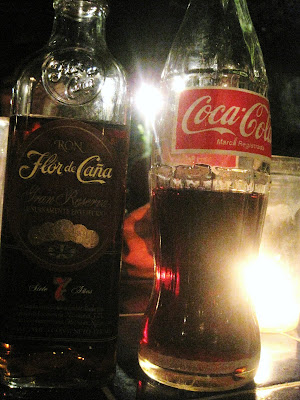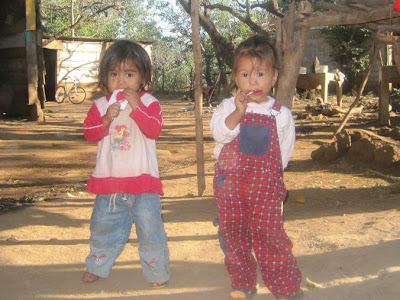
A Good Thursday
Wednesday night, I didn’t sleep much again. Instead, I spent the night in-and-out of sleep, pushing our little stray kitten off my bed, convincing myself that I could feel the fleas in my bed biting me and trying to drain out the snorers in my room with The Beatles and Johnny Cash. For waking up cranky and not knowing if I actually slept or not, Thursday turned out to be a great day. Six hours of cement mixing flew by to the tunes of Snoop Dogg and the Doors and before I knew it I was stuffing my face full of rice, beans, and a saucy chicken dish at lunch. After, I had my first ‘intercambio’ (English-Spanish exchange) with Silvia, a teacher in the school in the first housing project. My Spanish came back, I enjoyed tutoring her in English, and she promised to teach me how to ride her motorcycle. On the 10 minute walk back to my volunteer house, I heard the unmistakable crack of a wooden baseball bat. I ran behind the church to the mid-sized dirt soccer field surround by brush, trees, and barbed-wire fence to find a group of guys taking some batting practice and fielding. I took the field in my sandals and didn’t stop smiling as I chased after the floating “baseballs” – a homemade combination of tightly wound string and red tape. With the bat in my hands, I kicked off my sandals and dug my bare feet into the dirt. Looking down at my dirt-covered toes, I thought of watching the MLB growing up and seeing clips of kids playing literally wherever they could in the Dominican Republic, Puerto Rico, and the like. Hitting balls under the setting sun with people who loved to play that much is something I will never, ever forget.
Kids’ Day at the Beach
At dinner, Pato – our most devoted volunteer here – announced that on Friday there was a trip to the beach and that she needed every volunteer that could come to do so. Nobody seemed too upset. We pulled up to the glistening waters of Lake Nicaragua, the only thing obstructing the view was the perfectly shaped volcano Concepcion. We were all silently disappointed that we weren’t at the ocean, but within minutes both kids and volunteers had stripped down to their swim trunks and were splashing around in the tiny waves of the lake. Before long, there was a vicious volunteer vs. kids game of keep-the-ball-away they dove, jumped, and fought to get a hold of the coveted tennis ball. We lost ourselves to the kids still living in each of us and the kids loved the game even more as we refused to hold back on our pint-sized opponents. I hadn’t laughed and let go of my “mature self” like that in quite some time. It reminded me of something my dad told me once. He told me when he turned 18 he thought, “Oh shit, I’m 18. I don’t feel like an adult.” Then the same thing at 25, and then 40, and so on. It was good to see I could revert back to “Little Tommy” when the moment called.
Baseball
Friday night, Granada played Leon at home in the 5th game of their national baseball championship. After waiting for the habitually tardy Spanish girls, we got into town to try and snag one of the few remaining seats in the stadium. We pulled up into the parking lot, and the crowd was deafening. There couldn’t have been more than 5,000 people crammed into that stadium, but it seemed louder from the outside than I ever heard at Shea Stadium. The game was sold out, so we decided to go watch it at a bar in town. Before we left, however, we saw them “deliver” the beer into the stadium. The video will say it better than I ever could, but just keep in mind he did this at least 50 times.
Granada ended up losing the series and we ended up having some Flor de Cana rum, the internationally renowned Nicaraguan rum that goes down smooth even on the rocks. Aside from us stuffing seven people into a taxi on the way home, the night was pretty uneventful.
Not being able to get into the game on Friday left me itching to watch a game. Luckily, I found out that the department of Granada had its own baseball championship on Sunday and that a La Prusia local, Luis – or as they call him, “Aleman” (literally, German) – was the star of the team. With the other volunteers I had hung out with Aleman a couple times, once at the Laguna, once out on the town, and through randomly seeing him around the barrio. At the lagoon, we were throwing rocks and suddenly all you heard was a whoosh and saw a tiny rock getting smaller and smaller. The lanky six-foot Aleman has a cannon for a throwing arm. I needed to see him play.
We showed up at the vacant stadium on Sunday morning in time for the first game of the double-header. Aleman’s team was down in the series 3-1. Having gone out the night before for his birthday, he showed up late for the game and the coach benched him. The one-level stadium with seats extending only to first base was speckled with people quietly observing the boring match. The teams dressed in recycled jerseys, including an old Mika Piazza Mets jersey, quickly rotated on and off the field as base-runners were few and far between. Finally, in the bottom of the 11th inning, Aleman’s team had a base-runner in scoring position. With one out, the next batter cracked a single into left field and, just like that, the boring game was over. Baseball can be one boring game, but God I love it.
They went on to lose the second game of the double-header and the series as well.
A Birthday Party in La Prusia
I mentioned that Aleman had his 22nd birthday the day before the game, and on Saturday the volunteers baked a little birthday cake and brought it down to his family’s house by The Rocks. We got down there around 8pm, and spirits were high. Aleman, Danny (another one of the guys who regularly hangs out with the volunteers), and Alex, another one of the guys, were standing in the street, ripping on each other as always and laughing their asses off. A couple three or four year olds ran around tugging on our shirts and showed us their bachata dancing skills. A group of men hung around a table playing cards while the women chilled out on hammocks and rocking chairs, taking a break from their relaxation to fetch us plastic cups of soda and cut the birthday cake.
Aleman and the gang are all 21 and 22 years old, but we all might as well be 15 again when we hang out. They’ll sneak around, tapping someone’s shoulder or find creative ways to give each other the middle finger or make a bunch of “maricon,” gay, jokes about each other. Standing in the street, talking and doing nothing and everything, reminded me of being at home with my friends and just standing in one of our driveways, talking about nothing and everything. It was no different here, minus the bachata beats coming out of the speakers.
Ant Attack
There are lots and lots of ants in La Prusia. Ants on trees, ants on the ground, and ants on any piece of food that's left unattended outside for more than five minutes - they're everywhere. On Sunday, we were attacked.
During a game of Catan (or Settlers), a few of us felt a few extra critters crawling over our feet. We looked at our house wall and there were literally hundreds of the little black creatures scaling it, some going in and some coming out carrying little treasures from inside. Then we noticed they were everywhere - on the columns, on the patio, on the ceiling - and there were more and more coming. It took several minutes of intense spraying by Anna for the invaders to redirect their course.
On Friday, the other volunteer was attacked, but much worse. There were literally tens of thousands scrambling away from the house by the time I got there, and a mound of casualties a few inches thick. They retreated in three files, each about four inches wide, and it took 20 minutes for them all to evacuate. If you lied down in there way they probably could have eaten you alive. Or at least carried you somewhere. Nature is impressive, sometimes scarily so.











